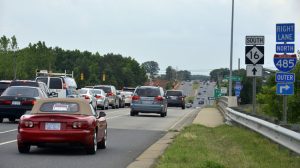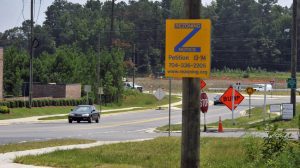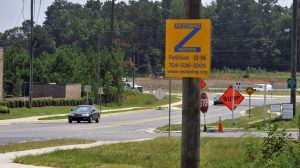Articles About Environment and Planning

Two weeks ago I beamed with pride for Charlotte as U.S. Transportation Secretary Anthony Foxx and Mayor Dan Clodfelter cut the ribbon to begin the CityLynx Gold Line streetcar service. I’ve lived in and visited cities with streetcar lines and often longed for an America where tracks once again crisscross our cities. The past can […]

Last September, a group of enthusiasts pulled together a series of eight small parks-for-a-day in on-street parking spots along Tryon Street in uptown Charlotte. Now, the city’s Department of Transportation is offering its official stamp of approval to these “parklets.” Or at least, it’s offering a process for you to get a permit to install […]

[highlight]Charlotte leaders have been talking about the outerbelt, Interstate 485, for decades. While most residents were concerned primarily with what it would mean for drive times, planners and others spent time contemplating the highway’s effect on the area’s growth. A sampling of comments over the years.[/highlight] “We’re going to have to get far more serious […]

The average American city zoning ordinance could win a contest for most boring book, and a book about zoning might normally be a close second. However, Sonia Hirt’s closely reasoned new book, Zoned in the USA, makes a seemingly dull subject resonate beyond a professional audience. Hirt, a professor and associate dean in the College […]

The following is excerpted, with permission, from Margins of a Greater Wildness: Nature Essays on Stanley Creek and Beyond, a collection of essays by Richard Rankin on local topics from the Stanley Creek community in eastern Gaston County, where the Rankin family has lived for many generations. One person is primarily responsible for the rediscovery […]

Mecklenburg’s 3,000 miles of creeks run through every part of the county. This includes uptown Charlotte, although such an urbanized spot of land might be the last place you would expect to find creeks. Many of uptown’s small creeks have been hidden from view over the years as land uses changed and storm pipes and […]

A bill has passed the N.C. House that would do away with a decades-old provision for rezonings, the protest petition, which lets nearby property owners petition for a supermajority vote by a city council or town board on whether to approve the rezoning. In this pro/con package of opinion articles, Dilworth resident Jill Walker discusses […]

The N.C. House in March passed a bill to do away with the use of protest petitions in rezonings statewide, and neighborhood groups in Charlotte and other fast-growing communities fear they will lose their voice in shaping development. They are mistaken. The majority of rezonings in Charlotte do not generate valid protest petitions from neighboring […]

It is exasperating that, once again, North Carolina homeowners face the prospect of losing the ability to file a protest petition in rezonings. The most recent effort – a bill that has passed the N.C. House – represents the third time in less than three years that our state has been threatened with the loss […]

Tuesday was an almost perfect spring morning: cool, sun coming up and spring flowers ablaze. As I relished a morning walk about 4 miles south of uptown, I also relished something perhaps more gruesome. I gleefully squished dozens of green cankerworms that had fallen onto the street during Monday’s rain. April in Charlotte is a […]

Richard Jackson thinks it’s time to stop blaming individuals for the U.S. obesity problem. The problem, he believes, is far more systemic, including the automobile-centric design of modern American life and the ready availability of high-sugar and high-fat foods. He thinks today’s parental fears of child abductions are not realistic and hurt children’s need for […]

Can the buildings, streets and sidewalks around you change your health? Richard J. Jackson thinks they can. Jackson, professor at UCLA Fielding School of Public Health, has made the creation of healthier environments his life’s work. He’s the author of books including Urban Sprawl and Public Health, published in 2004, which examined the connections between […]